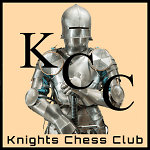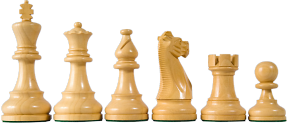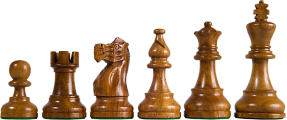
Knights Chess Club
Welcome To All, Young And Old


The Benefits Of Chess
Chess is a game for people of all ages.
You can learn to play at any age, and in chess, unlike many other sports, you don't ever have to retire. Age is also not a factor when you're looking for an opponent—young can play old and old can play young.
Chess welcomes those with physical handicaps.
If you're confined to a wheel chair or can not participate in other sports for health reasons you can fully enjoy the rewards of playing chess, and initiate many friendships.
Chess teaches good sportsmanship.
In chess you will experience wins, losses, and draws no matter what your playing level. Whether you win or loose chess teaches us how to be graceful in victory, and honorable in defeat. Learning good sportsmanship is an important part of the game.
Chess promotes lasting friendships.
All chess players share one thing in common, which is their love of the game. Whether through local club play, frequenting tournaments, team play, or just having fun many friendships are often formed that last a life time.
Chess bridges all races and colors.
We are all brothers and sisters in chess. Irregardless of color or nationality chess players are always welcomed, and welcome each other. There is a fellowship amongst chess players that goes beyond color or race.
Chess develops memory.
During a game players will often analyze various potential moves each turn, and think through the maze of "if I do this, then they'll do that" possibilities. In this way chess has been found to sharpen memory, which in turn extends beyond the chess board.
Chess improves concentration.
There are a lot of possibilities that arise during a game of chess. To think through the maze of potential moves, the positions that may arise, and remember what you're thinking about requires concentration. As with the other benefits of chess, the more you play the more you learn the art of concentration.
Chess develops logical thinking.
Chess develops an understanding of logical strategy. For example, you will learn that it is important to bring your pieces out into the game at the beginning, to keep your king safe at all times, not to make big weaknesses in your position and not to blunder your pieces away for free. The logic and methodity learned behind the chess board often translates into a valuable guide in every day decision making.
Chess promotes imagination and creativity.
It encourages you to be inventive. There are an indefinite amount of beautiful combinations yet to be constructed.
Chess develops the capability to predict and foresee consequences of actions.
Whether good, or bad, justice always prevails on the chess board. Chess encourages that we think things through, rewarding good decisions and punishing the bad. It teaches you to look both ways before crossing the street. This is another discipline that having been learned on the chess board can improve the quality of our everyday decisions in life.
Chess inspires self-motivation.
It encourages the search of the best move, the best plan, and the most beautiful continuation out of the endless possibilities. It encourages the everlasting aim towards progress, always steering to ignite the flame of victory.
Chess shows that success rewards hard work.
The more you practice, the better you'll become. You should be ready to lose and learn from your mistakes. One of the greatest players ever, Capablanca said, "You may learn much more from a game you lose than from a game you win. You will have to lose hundreds of games before becoming a good player."
Chess improves schoolwork and grades.
Numerous studies have proven that kids obtain a higher reading level, math level and a greater learning ability overall as a result of playing chess. For all those reasons mentioned above and more, chess playing kids do better at school and therefore have a better chance to succeed in life.
Chess opens up the world for you.
You don't need to be a high ranked player to enter big important competitions. Even tournaments such as the US Open and the World Open welcome players of all strengths. Chess provides you with plenty of opportunities to travel not only all around the country but also around the world. Chess is a universal language and you can communicate with anyone over the checkered plain.
Chess enables you to meet many interesting people.
You will make life-long friendships with people you meet through chess.
Chess is inexpensive.
You don't need big fancy equipment to play chess. It is good to have a chess set at home to practice with family members, to take to a friend's house or even to your local neighborhood park to get everyone interested in the game, but the cost of obtaining a chess set is minor.
Chess and Mathematics.
You don't have to be a genius to figure this one out. Chess involves an infinite number of calculations, anything from counting the number of attackers and defenders in the event of a simple exchange to calculating lengthy continuations. And you use your head to calculate, not some little machine.
Chess and Research.
There are millions of chess resources out there for every aspect of the game. You can even collect your own chess library. In life, is it important to know how to find, organize and use boundless amounts of information. Chess gives you a perfect example and opportunity to do just that.
Chess and Art.
In the Great Soviet Encyclopedia chess is defined as "an art appearing in the form of a game." If you thought you could never be an artist, chess proves you wrong. Chess enables the artist hiding within you to come out. Your imagination will run wild with endless possibilities on the 64 squares. You will paint pictures in your mind of ideal positions and perfect outposts for your soldiers. As a chess artist you will have an original style and personality.
Chess and Psychology.
Chess is a test of patience, nerves, will power and concentration. It enhances your ability to interact with other people. It tests your sportsmanship in a competitive environment.
CHESS IS FUN!
This isn't just another one of those board games. No chess game ever repeats itself, which means you create more and more new ideas each game. It never gets boring. You always have so much to look forward to. Every game you are the general of an army and you alone decide the destiny of your soldiers. You can sacrifice them, trade them, pin them, fork them, lose them, defend them, or order them to break through any barriers and surround the enemy king. You've got the power!
Some material excerpted or adapted from the Illowa Chess Club: TEACHER'S GUIDE: RESEARCH AND BENEFITS OF CHESS by Dr. Robert C. Ferguson






